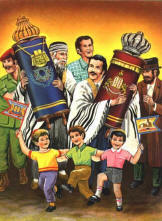
Shemini Atzeret
The Shemini Atzeret (also written Schmini Azeret) celebration takes place on the eighth day of Sukkot. In the past, during Sukkot, Jews would offer sacrifices and special gifts to God on behalf of all the nations. However, on Shemini Atzeret, these offerings are specifically for the people of Israel, as commanded by God. Shemini means eight, and Atzeret means assembly or solemn assembly, hence, Shemini Atzeret means the Assembly on the Eighth [Day].
The Night of Destiny
Night time is when Arava (ערבה) occurs, or the Jewish Night of Destiny, the final chance to seek forgiveness before God’s judgement is finalized and sealed. Believers observe this last opportunity with all-night vigils and religious rituals, including the recitation of Hoshanot.
Rituals and Prayers of Shemini Atzeret
After the Shacharit prayer, worshippers take the lulav and etrog (citrus fruit and palm branches) and circle the Torah placed on the Torah Ark seven times, praying and supplicating. Hallel is recited, and a special prayer for rain is read. From this day until the first of Nisan, the daily prayers include requests for rain. From the first day of Passover until the eighth day of Sukkot, a prayer for dew is said instead. Additionally, the ritual of beating the willow branches is performed.
Remembering the Dead
Among Ashkenazi communities, it is customary on this day to recite the Yizkor prayer (יזכיר) in memory of the deceased.
Simchat Torah
The day after Shemini Atzeret, which makes it the ninth day of Sukkot, is Simchat Torah. Jews gather in synagogues to celebrate the completion of the annual Torah reading cycle and to begin anew. They read the final and the first parashot of the Torah.
Shemini Atzeret in Israel
In Israel, Shemini Atzeret and Simchat Torah are observed together. The Hebrew calendar is also designed so that the first day of Rosh Hashanah and Sukkot never fall on a Sunday, Wednesday, or Friday.


 فارسی
فارسی